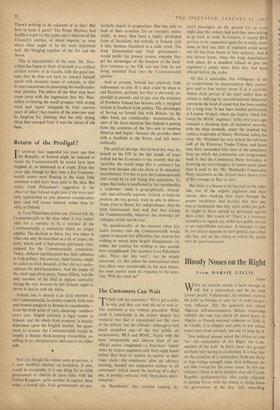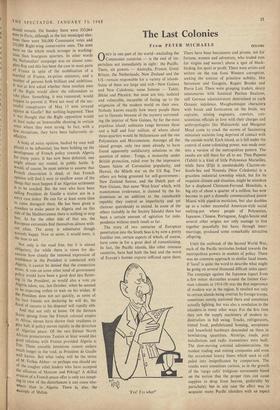Bloody Noses on the Right
From DARSIE GILLIE
WHAT an election means is hard enough to tell, but a referendum can be an even greater puzzle. A shoemaker, for instance, went to the polls on Sunday to vote `no' in order to pre- vent inflation. Yet the question was about Algerian self-determination. Before examining whether the vote was above all about peace in Algeria or French national cohesion or faith in dc Gaulle, it is simpler and safer. to ask whose noses were most seriously put out of joint by it.
Two political iroups asked the citizen to vote 'no'—the nationalists of the Right, the Com- munists of the Left. In Paris these two groups are both very strong in an election. It is true that on the occasion of a referendum both are likely to lose voting strength since their followers do not like voting for the same cause. In this the ordinary citizen is more sensitive than the Fourth Republic parliamentarian who rarely objected to joining forces with the enemy to bring down the government of the day. Still, something
should remain. On Sunday there were 335,064 noes in Paris, although at the last municipal elec- tions there were 366,000 Communist votes and 231,000 Right-wing conservative ones. The noes were on the whole much stronger in working- class than bourgeois quarters. In other words the Nationalists' campaign was an almost com- plete flop and this has been the case in most parts of France in spite of the mobilisation of a marshal of France, ex-prime ministers, and a number of persons both brilliant and ambitious. It was at first asked whether these resolute men of the Right would allow the referendum to take place. Something, it was rumoured, would happen to prevent it. Were not most of the suc- cessful conspirators of May 13 now arrayed against de Gaulle? But nothing happened. Then it was thought that the Right opposition would at least make an honourable showing in certain areas where they were strong. In fact, with a few exceptions, they have been ludicrously in- effective.
A body of noisy opinion, backed by men well Placed to be influential, has been holding up the development of French policy towards Algeria for many years.. It has now been defeated, one might almost say routed, in public battle. It Would, of course, be most unwise to assume that French chauvinism is dead, or that French °Pinion will find it easy to swallow some of the things that must happen if an Algerian settlement is to be reached. But the men who have been Calling President de Gaulle a traitor are in a sorry case today. He can for at least some time to come disregard them. He has been given a mandate to make peace in Algeria and on this Side of the Mediterranean there is nothing to stop him. As for the other side of that sea, the European extremists find themselves almost with- out allies. The army is submissive though scarcely happy. Now or never, it would seem, is the time to act.
Not only is the road free, but it is almost Obligatory, for while there is room for dis- cussion how closely the renewed expression of Confidence in the President is connected with Algeria, it cannot be denied that the connection exists. A vote on some other issue of government ,13°IicY would have been a good deal lens flatter- ing to the President, as would also a vote ,on Algeria taken, say, last October, when he seemed to be expecting events to wait on his wishes. If the President does not act quickly, as some of his best friends are declaring he will do, the flood of success at his disposal will rapidly ebb. And that not only at home. Of the thirteen States sprung from the French colonial empire in Africa, eleven have shown their readiness to Play ball, if policy moves rapidly in the direction of Algerian peace. Of the two former North African protectorates Tunisia at least would like good relations with France provided Algeria is free. These amiable intentions cannot endure much longer in the void, as President de Gaulle Well knows. But what today will be the terms of M. Ferhat Abbas—or perhaps one should say a the tougher rebel leaders who have accepted the alliances of Moscow and Peking? A skilful evasion of a French peace offer is only too tempt- ing in view of the disturbances it can cause else- Where than in Algeria. There is, alas, the example of Melun.



































 Previous page
Previous page